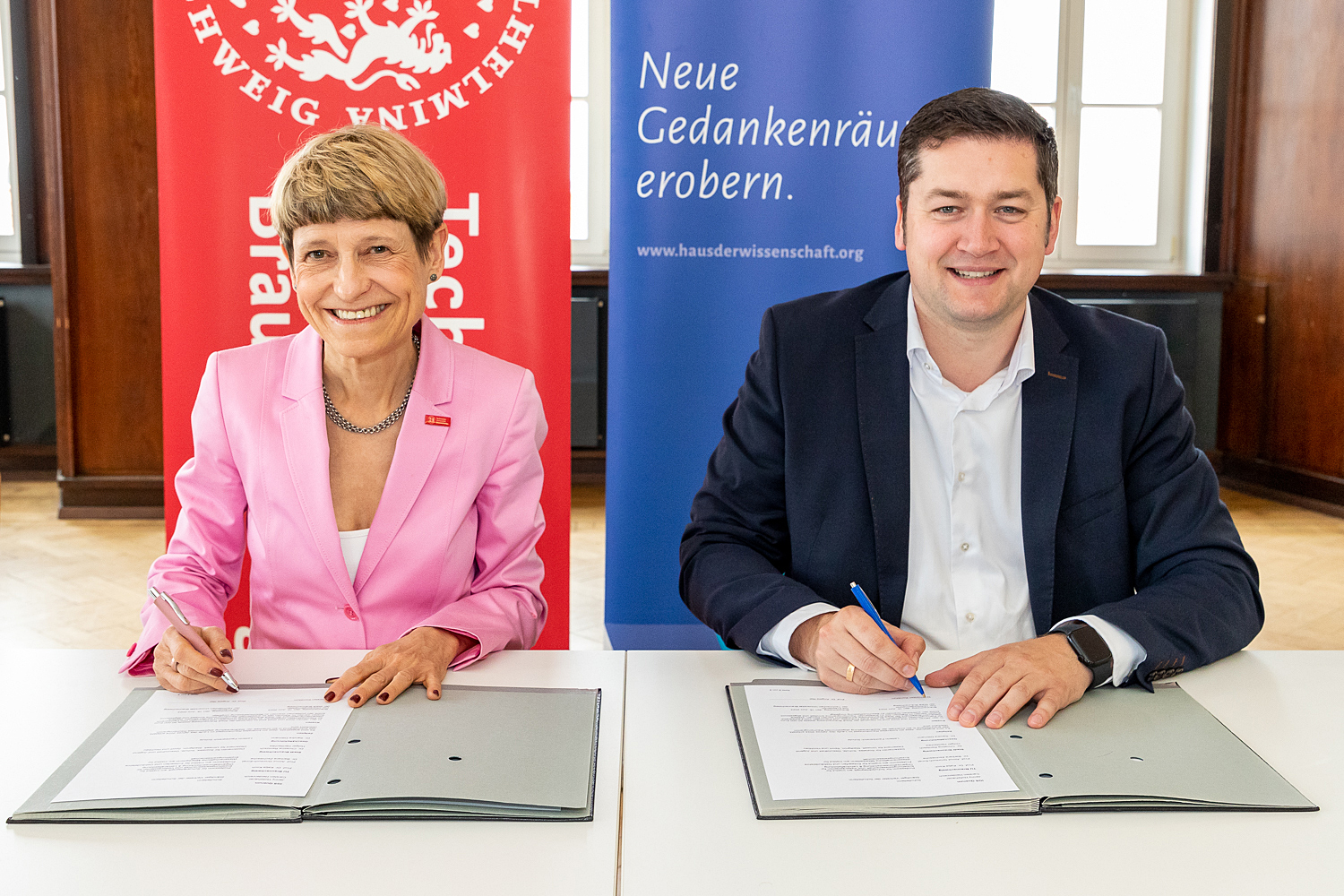Scientific “Modellprojekt Raumpädagogik” at the IGS Querum TU Braunschweig and City of Braunschweig sign cooperation agreement
Press release of the City of Braunschweig
The City of Braunschweig and Technische Universität Braunschweig want to jointly realise a scientific model project entitled “Raumpädagogik an der Integrierten Gesamtschule (IGS) Querum“ (Spatial Pedagogy at the Querum Integrated Comprehensive School (IGS)). TU President Angela Ittel and Lord Mayor Dr. Thorsten Kornblum signed a cooperation agreement to this effect on Friday, 16 June. The model project envisages involving the users in the creation of a spatial programme for the IGS Querum and accompanying this scientifically. At the same time, it is to be examined whether the school can be developed into a “research school”.

TU Braunschweig President Angela Ittel and Lord Mayor Dr. Torsten Kornblum sign the cooperation agreement on the “Modellprojekt Raumpädagogik” at IGS Querum. Photo credit: Kristina Rottig/TU Braunschweig
The model project addresses the question of how school spaces must be designed so that they can become learning spaces. The Institute of Educational Science and the Institute of Design and Architectural Strategies at TU Braunschweig, the City of Braunschweig and the IGS Querum are cooperating on this. What is special here is that spatial planning and educational science perspectives are linked together before the actual planning and, in particular, the people who will ultimately work and learn in the rooms are involved in the planning.
Background: IGS and Querum primary school share a common location. Due to new construction areas, the number of pupils is increasing, which is why the primary school is being expanded to four classes and at the same time converted to all-day operation. For this purpose, it receives a completely new building, together with a three-subject sports hall for primary school and IGS. Due to the new buildings, the IGS will have to give up previously used areas, primarily the school library, recreational and sports areas and the school garden. In the meantime, temporary alternative accommodation (containers, etc.) will be provided.
After the new building, the IGS will have the former primary school building at its disposal, including the outdoor areas. This is where the model project should start: with a scientifically accompanied “Phase 0”. This is the period of time that precedes the actual planning, in which the needs of the future users are determined in dialogue with the builders. Pupils, teachers, school management, other school staff and parents are involved in this dialogue. The cooperation between the university, the city and the school also offers the opportunity to develop the IGS Querum into a “research school”.
“The ‘Research School’ is an excellent opportunity for teacher training at our university, as here we can design, develop and implement transdisciplinary research projects together with Educational Sciences and teachers on site,” emphasises TU Braunschweig President Prof. Angela Ittel. “With the Educational Sciences and Architecture at TU Braunschweig, we have the unique opportunity to explore and test the inseparable connection between learning, teaching and spatial design in everyday school life. New didactic and spatial concepts, procedures and ideas could be further developed here in close exchange with future teachers and form the environments in which the education of tomorrow takes shape.”
“All those involved can benefit in a special way from this model project,” states Mayor Dr. Kornblum. “In dialogue with the scientific community, the IGS can redesign the spatial structure of the old primary school building according to the latest pedagogical findings and requirements. And with a permanent research school, our city would receive a lighthouse project on teaching and learning research as well as spatial pedagogy that would radiate far beyond the borders of the region.”
Good spatial design supports pupils’ learning. Intensive project preparation reduces the risk that corrections will have to be made afterwards, resulting in time delays and additional financial burdens.
Building on the close connection between Architecture and Educational Sciences, it should be examined in parallel whether the IGS Querum can develop into a “Research School” in cooperation with TU Braunschweig. As such, it would open up the possibility for Educational Sciences, in cooperation with Architecture at TU, to test and accompany new concepts of school development and organisation, teaching-learning and classroom research, as well as the respective interdependencies with spatial design in everyday school life.
Research into suitable spatial and didactic concepts for schools is becoming increasingly relevant as curricular content and didactic procedures change. Traditionally, schools were equipped for frontal teaching in class, in which a teacher imparts knowledge centrally from the front to the children and adolescents, who in turn passively absorb this knowledge – sitting uniformly oriented towards the teacher. The City of Braunschweig has already broken new ground here in the past, e.g. in the construction of the Wilhelm-Bracke-Gesamtschule, and planned new buildings without a traditional room structure. Contemporary content such as the “21st Century Skills”, which define communication, creativity, critical thinking and collaboration as core competencies, will require a more active role for learners in diverse learning settings in the future. This requires spaces that enable individual learning in flexible time structures.
Timetable: The aim is for a concrete spatial concept to emerge in the course of 2024, which will then be translated into a spatial programme agreed within the city administration.
